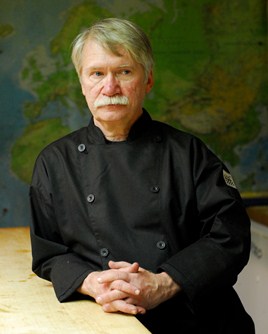Guest Speaker: There and Back Again
03 June 2012
 A career educator with 42 years in the food business divulges “musts” to achieve the critical successful relationship between culinary graduate and employer.
A career educator with 42 years in the food business divulges “musts” to achieve the critical successful relationship between culinary graduate and employer.
By Paul Sorgule, MS, AAC
Even with unemployment looming as one of our country’s greatest challenges, restaurants, hotels and resorts still struggle to find enough qualified, professionally committed individuals to staff their kitchen brigades. Last count there were somewhere between 1,500 and 2,000 schools in the United States with culinary programs. Why is there still a gap between supply and demand?
This year marks my 42nd year in some facet of the food business. I spent 10 years in kitchens from line cook to executive chef after a two-year college program in hotel management. Twenty-six years followed in college-level culinary education beginning as instructor and finishing as the dean of Culinary Arts and Hospitality Management. During that time I completed both baccalaureate and master’s degrees in related fields and dedicated a few weeks each year working in kitchens to stay fresh. I worked diligently with the American Culinary Federation to earn accreditation for the program, served a few years on the Accreditation Committee and was appointed as the chair of the ACF National Education Committee. This time in education afforded me the opportunity to serve as a member of the 1988 New England Culinary Olympic Team and in 2001 was honored as the ACF National Culinary Educator of the Year.
After 26 years I realized that I was still out of touch with what the industry expected from culinary-school graduates. I thus returned to the role of executive chef at a four-diamond resort and had to re-acclimate to the rigors of “real life” in the kitchen. I did this for nearly four years before returning to education as vice president of culinary education at a prominent college and with a fresh perspective on what an effective curriculum should look like.
What I grew to understand should have a significant impact on curriculum development and the relationship that schools have with the food industry that they serve.
-
The value of real-life experience cannot be over-estimated.
STUDENTS AND GRADUATES MUST: - truly know the foundations of cooking (knife skills, cooking methods, product identification, etc.)
- be the torch bearers of professionalism in how they look, act, treat others and respect the chain of command
- understand that, first and foremost, they are in the service business
- be focused listeners and respectful communicators
- be able to follow directions
- understand how to hustle
- be organized and work clean
- be eager to learn more on the job
- be willing and able to learn how to become problem solvers
- respect the product they are working with and the cost associated with it
- have a strong work ethic, because above all else, it is an expectation
Now, as educators, regardless of what we would like to see in a curriculum, these 12 critical points must be woven into the design. Chefs will clamor to hire interns and permanent employees who demonstrate these skills and attributes.
On the employer side, the issues are just as significant.
- Employers must realize that culinary interns and graduates still need to acclimate and build confidence and the speed that follows. Some level of patience on the part of the chef is required.
- Chefs need to recognize that they are educators as well, and they will contribute to the development of students and graduates as valuable employees in their hands.
- Just as the expectation is for students to be professional, so, too, should be the expectation of the culinary staff of the operation.
- Push students to improve, challenge them beyond their comfort zones, be there to bail them out before they fall, and provide honest and frequent critique of their work.
- Communicate effectively and frequently with the student or graduate, and in the case of interns, communicate effectively with representatives of the school.
- Interns and recent graduates are employees just like any other. A recent trend toward requiring students to stage for free in exchange for the privilege of learning beside a chef is not acceptable. They should be paid like any other and evaluated based on their performance to a standard.
In the end, the two connections that I have made are that any culinary education must have a significant “real life” component both in the form of internships and classroom activities that properly prepare them for a very demanding career choice. This part of the curriculum must be approached with the same amount of commitment as any other course. We must maintain a strong line of communication with internship and employment sites, including offering “train the trainer” connections.
Employers need to realize that their ability to navigate through the challenges of addressing employment needs rests with a positive bond between their operations and culinary schools. Together, we are preparing the next generation of cooks, chefs and managers.
Most recently I have formed a consulting firm, Harvest America Ventures (www.harvestamericaventures.com), designed to work with restaurants and culinary colleges on training, curriculum development, concept design, menu mechanics and nutritional labeling.
Paul Sorgule, MS, AAC, president of Harvest America Ventures, a “mobile restaurant incubator” based in Saranac Lake, N.Y., is the former vice president of New England Culinary Institute and a former dean at Paul Smith’s College.
Additional Info
- CAFÉ Talks Podcast Lesson Plan: 8
